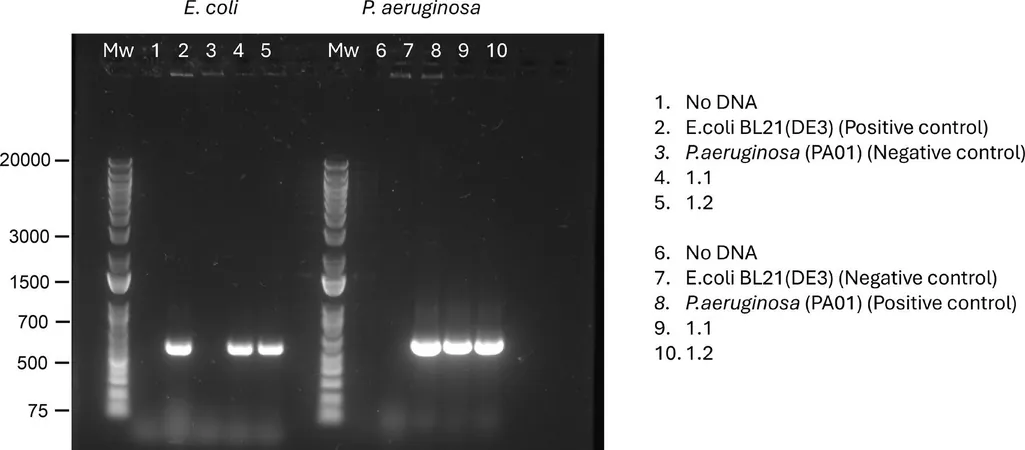
Revolutionary AI Models Set to Transform Protein Data Analysis in Medicine!
2025-03-31
Author: Daniel
Revolutionary AI Models Set to Transform Protein Data Analysis in Medicine!
In an exciting breakthrough for medical research, scientists have unveiled groundbreaking AI models designed to significantly enhance the accuracy and discovery potential within the field of protein science. These advanced models are poised to address critical challenges faced in personalized medicine, drug discovery, and diagnostics, offering a promising future for healthcare.
As artificial intelligence tools become increasingly prevalent, their impact is felt across a multitude of industries, particularly in biotechnology. AI advancements are driving transformative changes in areas such as drug development, precision medicine, gene editing, and food safety. One critical domain benefiting from these innovations is proteomics, the extensive study of proteins, where vast amounts of data can be analyzed to improve clinical outcomes.
The vast protein databases at scientists' disposal allow for the identification of proteins—and consequently microorganisms—present in various biological samples. This analysis is vital for diagnosing diseases, evaluating treatment effectiveness, and detecting pathogens in samples from patients. Dr. Timothy Patrick Jenkins, Associate Professor at DTU Bioengineering, highlights the current limitations of existing tools: "No single database holds all the answers, and identifying proteins that are not yet registered is a major challenge."
To overcome these hurdles, researchers have focused on developing "de novo sequencing algorithms" that aim to enhance accuracy and reduce computational demands. However, Jenkins and his colleagues from DTU, Delft University, and UK-based AI firm InstaDeep found that previous models still fell short of their potential.
Now, they are introducing two innovative AI models: InstaNovo and InstaNovo+. Published in *Nature Machine Intelligence*, these models are set to revolutionize how researchers, healthcare professionals, and commercial entities navigate extensive protein data. "Together, our models surpass existing state-of-the-art tools and show remarkable precision," notes Kevin Michael Eloff, research engineer at InstaDeep and co-first author of the study. "They are adaptable to various fields within proteomics, paving the way for advancements beyond medical applications."
To illustrate the models' effectiveness, researchers conducted extensive testing across several critical tasks. One notable investigation involved analyzing wound fluid from patients suffering from venous leg ulcers, a condition notorious for its complexity and difficulty in treatment. Here, InstaNovo was able to identify ten times more sequences than traditional database searches, including problematic organisms like E. coli and the multidrug-resistant bacterium Pseudomonas aeruginosa.
Another promising application of these models was their use in identifying peptides—small protein fragments crucial for immune system recognition of infections and diseases like cancer. InstaNovo discovered thousands of new peptides via advanced analysis, far exceeding the capabilities of conventional methods. These peptides, essential targets for immunotherapy in personalized cancer treatments, represent potential game-changing targets in tailored treatment plans.
The implications of the findings are profound, suggesting that these cutting-edge models not only enhance therapeutic sequencing and novel peptide discovery but also significantly elevate the science of proteomics. As Konstantinos Kalogeropoulos, co-first author and Assistant Professor at DTU Bioengineering, explains: "Our tests in challenging situations demonstrate the models' ability to substantially improve our understanding of complex biological interactions, which is critical for advancing personalized medicine and cancer immunology."
In total, the paper outlines six compelling case studies showcasing how InstaNovo and InstaNovo+ expand the horizons of therapeutic sequencing, organism detection, and proteomic research. Dr. Jenkins emphasizes that these advancements extend well beyond healthcare: "From a scientific standpoint, these tools enhance our overall comprehension of the biological world, impacting not just medicine but also industry and academic research."
With such promising developments on the horizon, the future of protein data analysis in medical research is indeed bright, and the applications of these AI models are only beginning to unfold. Keep an eye on the upcoming breakthroughs that could reshape our understanding of health and disease!




 Brasil (PT)
Brasil (PT)
 Canada (EN)
Canada (EN)
 Chile (ES)
Chile (ES)
 Česko (CS)
Česko (CS)
 대한민국 (KO)
대한민국 (KO)
 España (ES)
España (ES)
 France (FR)
France (FR)
 Hong Kong (EN)
Hong Kong (EN)
 Italia (IT)
Italia (IT)
 日本 (JA)
日本 (JA)
 Magyarország (HU)
Magyarország (HU)
 Norge (NO)
Norge (NO)
 Polska (PL)
Polska (PL)
 Schweiz (DE)
Schweiz (DE)
 Singapore (EN)
Singapore (EN)
 Sverige (SV)
Sverige (SV)
 Suomi (FI)
Suomi (FI)
 Türkiye (TR)
Türkiye (TR)
 الإمارات العربية المتحدة (AR)
الإمارات العربية المتحدة (AR)